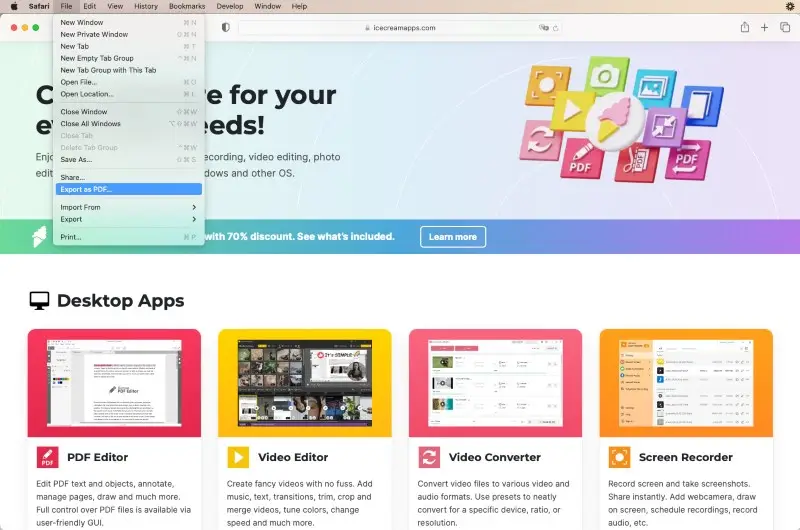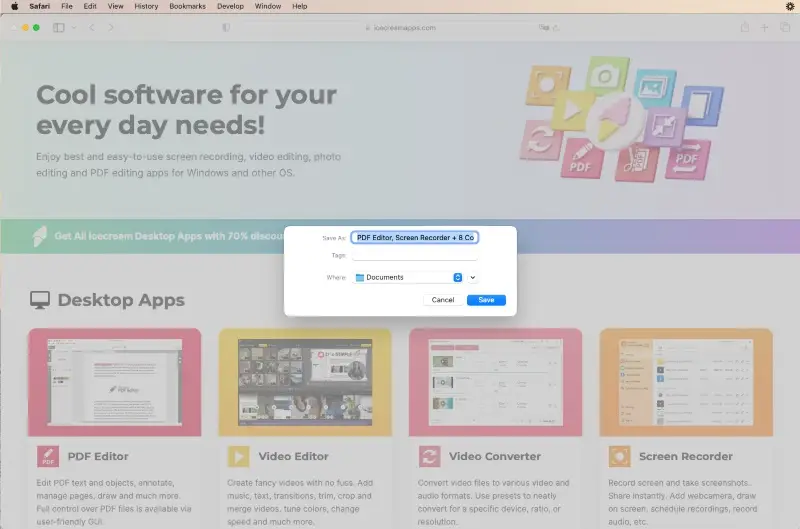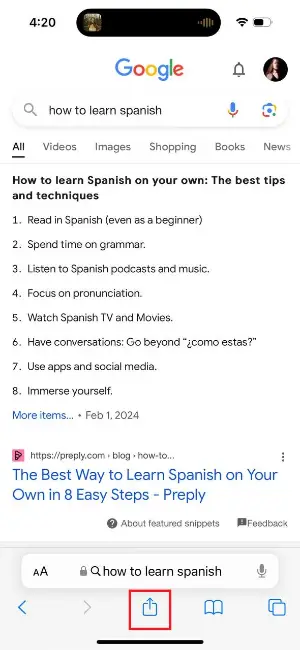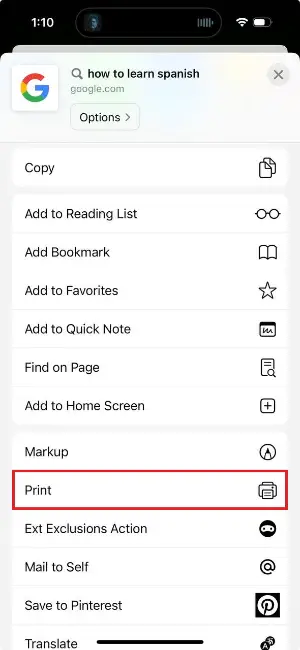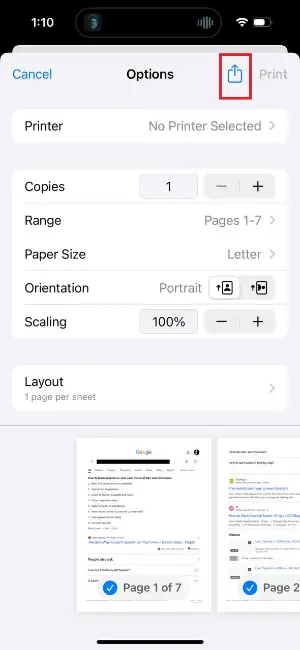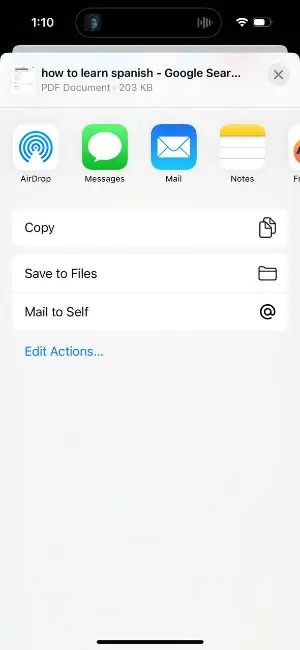4 Ways to Convert HTML to PDF
HTML, while excellent for web display, often lacks the versatility needed for printable and easily shareable documents. Knowing how to convert HTML to versatile PDF format bridges this gap, offering content integrity and compatibility across platforms.
This article explores 3 highly effective methods to accomplish the HTML file to PDF conversion. Whether you're a web developer seeking professional solutions or a non-technical user looking for intuitive options, we've got you covered.
PDF Candy Desktop
PDF Candy Desktop is a powerful and easy-to-use service for Windows that supports converting various file types, including HTML, to PDF and vice versa. It offers fast performance, offline functionality, and flexible settings for seamless document handling.
How to convert HTML to PDF on Windows
- Download, install, and launch the free PDF converter for Windows.
- In the main menu, choose the "HTML to PDF" tool.
- Drag and drop your file into the program window.
- Click the settings icon to adjust options such as page layout or adding a password to your PDF, if needed.
- Press the "Convert" button. Your link will be saved in the output folder you select.
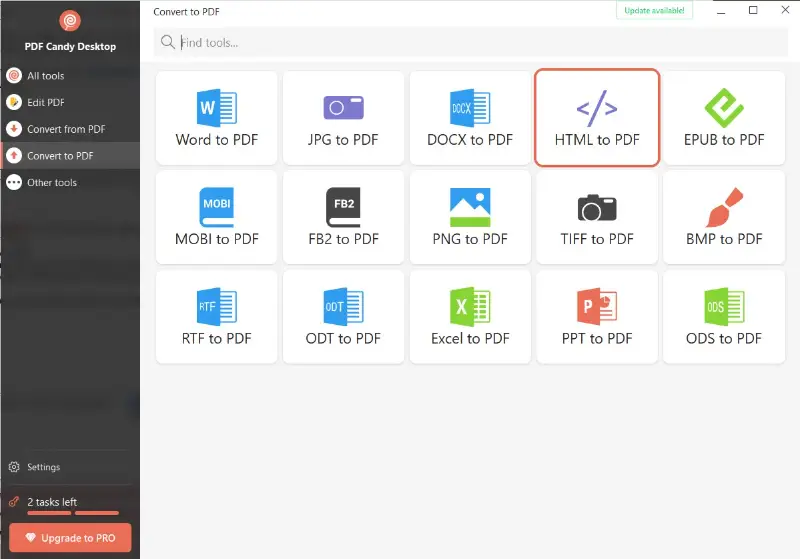
Pros:
- Offline functionality. All operations are done locally, ensuring speed and privacy without needing an internet connection.
- Batch processing. Convert multiple files to one PDF at once, ideal for bulk tasks and efficient workflows.
- Secure output. Easily apply password protection and other security settings to your documents.
Cons:
- Windows only. The PDF conversion software is currently available exclusively for Windows, with no macOS or Linux version.
Thanks to its offline performance, intuitive design, and advanced features, PDF Candy Desktop is a smart choice for users who need reliable and secure HTML to PDF conversions on Windows.
Browser
Many popular browsers offer built-in features that allow you to convert HTML to PDF without losing formatting quickly and hassle-free. This is a convenient and efficient way to preserve web content or share information in a universally recognized format.
The following instructions will guide you through the process of converting an HTML page to a PDF in different popular browsers.
How to convert HTML page to PDF in Google Chrome
- Open the page you want to convert in Google Chrome.
- Press Ctrl + P (Windows) or Cmd + P (Mac) to open the print dialog. Alternatively, right-click on the page and select "Print".
- In the "Destination" section, select "Save as PDF" from the dropdown menu.
- Customize print settings such as layout, margins, and paper size if needed.
- Click "Save" to create a PDF file from the HTML page.
If you see any missing areas on the preview, open "More settings" and make sure the "Background graphics" box is checked.
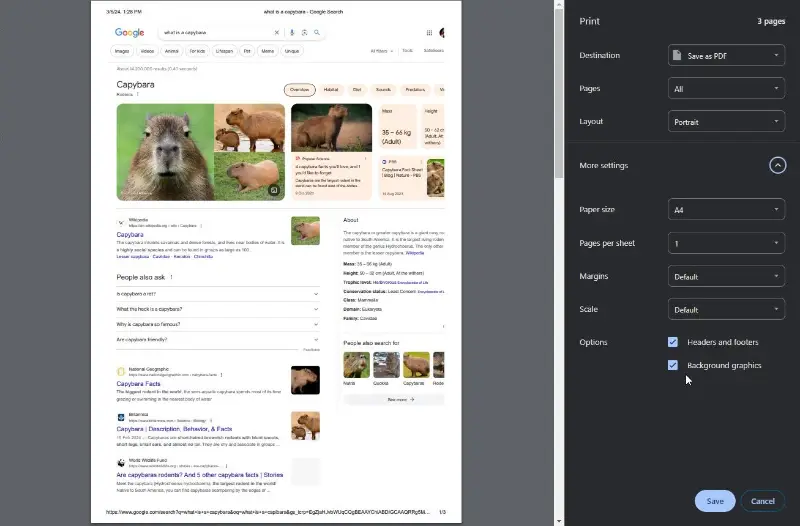
How to convert HTML to PDF with Microsoft Edge
- Go to the HTML page using Microsoft Edge.
- Press Ctrl + P (Windows) or Cmd + P (Mac). Alternatively, click three dots in the upper right corner of the page and choose "Print".
- Under the "Printer" section, select "Microsoft Print to PDF" or "Save as PDF".
- Adjust print settings according to your preferences. You can rotate the page, change the paper size, etc.
- Click "Save" and select a destination for the PDF document.
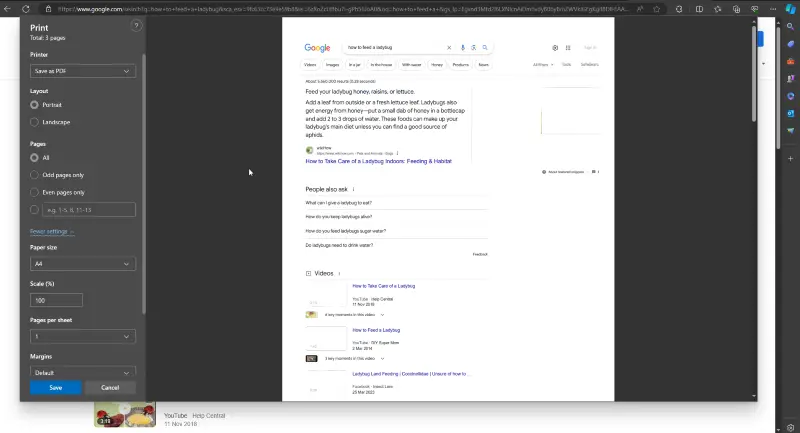
How to change HTML to PDF Safari (macOS)
- Navigate to the desired web page in Safari.
- Go to the "File" menu in the top toolbar and select "Export as PDF...".
- Select a destination and provide a name for the result file.
- Click "Save" to convert your HTML file to PDF format.
How to turn HTML to PDF using Safari (iOS)
- Open the page you need to convert to PDF using Safari on your iPhone or iPad.
- Tap the "Share" icon at the bottom of the screen. It looks like a square with an arrow pointing upwards.
- Scroll through the options until you find "Print". Tap on it.
- Tailor the settings according to your needs. You can also select the desired pages if you don't want to save all of them.
- Tap "Share". Pick "Save to Files" or share the document to other apps.
Converting HTML to PDF using a browser can have both advantages and disadvantages.
Pros:
- No installation required. Users can create PDF files from HTML pages without the need to install additional software, which can be convenient for quick tasks.
- Platform compatibility. This PDF conversion method works on various operating systems as long as a compatible browser is available.
- Editing options. Most browsers offer basic editing features, allowing users to modify the PDF content directly during the conversion process.
Limitations:
- Safari. While this functionality is available in the mobile version, you can't change any settings if you want to save HTML as PDF in Safari on your computer.
These steps may vary slightly depending on browser versions, but the general process remains consistent. If your browser does not have a built-in option, consider using online tools or dedicated browser extensions for HTML to PDF conversion.
Sejda
Sejda is an online platform that provides a suite of powerful and user-friendly tools to work on PDF documents. You can use it for PDF editing, merging, splitting, and conversion.
How to convert HTML to PDF online using Sejda
- Navigate to the Sejda website.
- Upload your HTML file or enter the URL of the webpage you want to convert.
- Customize settings such as page orientation and margins if needed.
- Click the "Convert HTML to PDF" button. The service will process the content of your web page, providing you with a downloadable PDF file.
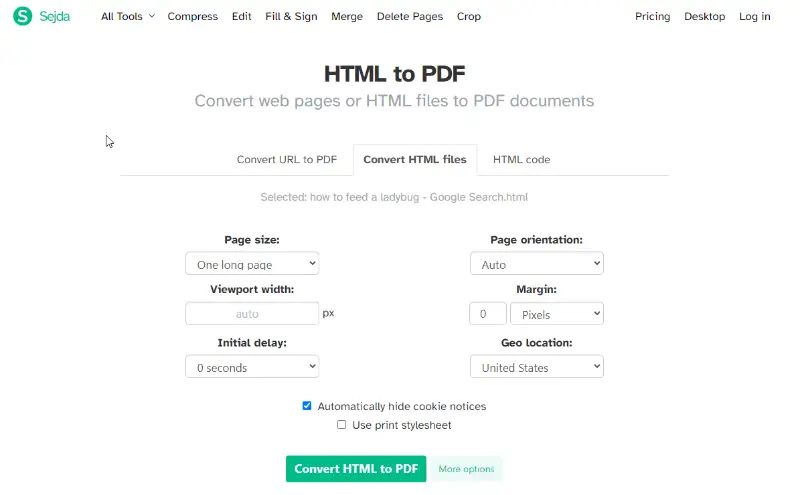
Pros:
- Customization options. The service offers various customization features, allowing users to adjust page layouts, margins, and other settings according to their preferences.
- Compatibility. The HTML to PDF converter works across different operating systems and browsers, ensuring seamless experiences on different platforms.
Cons:
- No preview. The platform lacks a preview feature, making it challenging to review the changes before finalizing the process.
- Batch processing. Only users with a paid subscription can convert several HTML files to PDF at once. The free version doesn't support bulk processing.
Sejda's user-friendly interface and cloud-based functionality make it a convenient choice for quickly converting HTML to PDF without extensive software installations.
PDF Candy
PDF Candy is a versatile online tool that offers a wide range of document-related functions, including converting HTML files to PDF. It's clean interface and straightforward navigation make it accessible to users of all experience levels.
How to turn HTML to PDF online on PDF Candy website
- Go to free online PDF converter official website using your preferred web browser.
- Click the "Add File(s)" button to upload your HTML webpage. You can also drag and drop it directly into the designated area.
- Hit "Convert" to change HTML to PDF format.
- Save the new document to your device.
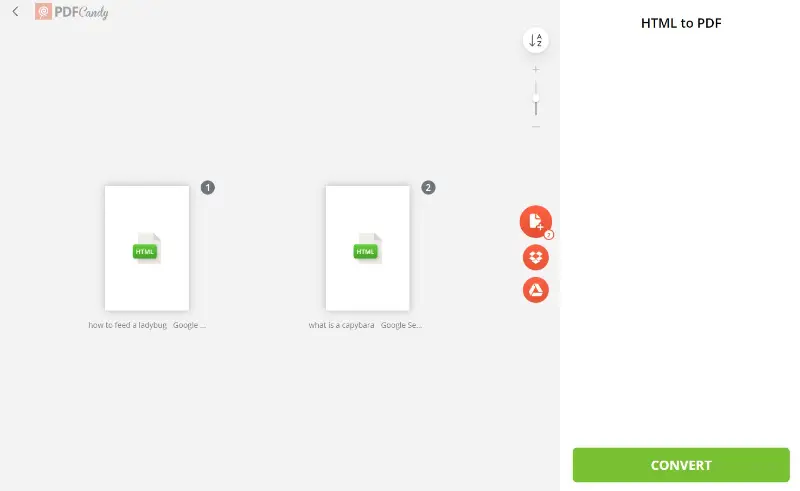
Pros:
- Versatile tool. Beyond HTML to PDF, it offers numerous other PDF-related tools, making it a one-stop shop for many document management tasks.
- No registration required. Users can process files without needing to sign up, ensuring a quick and hassle-free experience.
- Offline version available. For those who prefer or require offline access, PDF Candy provides a desktop version with similar functionalities.
- Secure handling. Uploaded files are automatically deleted from the server after a short period, enhancing privacy and data protection.
Cons:
- File size limitations. The free online PDF converter has a 50 MB restrictions on file sizes, which could be limiting for users with larger HTMLs.
PDF Candy is a reliable and easy-to-use tool for converting an HTML file to PDF, especially for those who need quick results without diving into complex software.
Common issues
| Issue | Description | Solution | ||
|---|---|---|---|---|
| Broken or Missing Images | Images may not appear in the PDF due to incorrect file paths or missing assets. | Ensure all pictures are correctly linked or embedded in the HTML. | ||
| Formatting Errors | The layout looks different in the PDF, such as misaligned text or images. | Use CSS to define precise margins and padding. Test with different PDF converters. | ||
| Fonts Not Displaying Correctly | Custom fonts might not render properly, showing default fonts instead. | Employ web-safe fonts or embed custom ones within the HTML. | ||
| Page Breaks | Content gets cut off or overflows across pages unexpectedly. | Manually insert breaks using CSS or set specific margins. | ||
| Large File Size | Complex HTML pages with lots of media can lead to large, slow-loading PDFs. | Optimize images and remove unnecessary elements from the HTML. | ||
| Text Clipping | Text can get clipped or cut off at the edges of the page. | Ensure there is enough space for text and adjust margins accordingly. | ||
| Encoding Issues | Special characters may appear as symbols or question marks. | Utilize UTF-8 encoding and declare it in the HTML <head> section. |
FAQs on using HTML to PDF converters
- Do I need an internet connection for HTML to PDF conversion using browsers?
- No, the printing feature is part of the browser's local functionality and does not involve sending data to external servers.
- Can I convert HTML documents with external elements, such as images?
- Yes, most PDF converters support the inclusion of external resources, ensuring that the PDF file accurately reflects the original document.
- Do these tools support the conversion of HTML documents written in languages other than English?
- Yes, all methods mentioned in this article allow you to create PDF documents from HTML files written in various languages.
- Can I preserve CSS styles during HTML to PDF conversion?
- Most tools can keep CSS styles, but the level of support varies. Inline styles generally convert better than external stylesheets or complex CSS.
- How do I convert multiple HTML files to single PDF?
- You can also manually combine PDFs after conversion.
- How do I ensure text is selectable in the resulting PDF?
- If the HTML content uses text elements (like
, etc.), the text will typically be selectable. Avoid using images to ensure text remains selectable.
- Can I save HTML forms as interactive PDF forms?
- Basic form elements like input fields may convert, but creating fully interactive PDF forms requires additional tools or manual editing.
Conclusion
Each method discussed - utilizing a desktop PDF converter, online services, or built-in browser tools - offers its own set of advantages, catering to different needs.
Whichever option you choose, the ultimate goal remains the same: to turn HTML content into accessible PDF format.
Whether it's for archiving web pages, creating professional documents, or simply preserving online content for offline use, mastering these conversion techniques empowers users across various domains.


